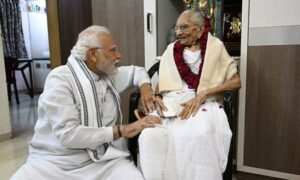
Vir has taken to walking the grounds of the bungalow every night since his return, though maybe stumbling is a better word, as he leans heavily on the sturdy mahogany cane yet still trips over every pebble, his own toes, even emptiness. Or perhaps “shuffling” is a better description for the slow, wavering, painful steps he is forced to take now.
He refuses to count the steps he must take until he is beyond the front door. Then there are eleven sliding paces across the shaded veranda; four agonising ones down the creaking wooden steps to the garden path. After the first three nights of struggling to grip the red-painted bannister and his unwieldy cane, of toppling over and rolling down to the pebbled path, he has developed a better system: he throws the cane down first and then grips the bannister with both hands, pushing and pulling his body sideways to make his way down. The manoeuvre still leaves him winded and his arms and shoulders burning, but at least he hasn’t fallen down since. Once he manages to pick up his cane and turn right, one hundred and three steps take him to the stone wall just high enough to stop him from flinging himself into the ravine beyond. It’s two hundred and three steps along this crumbling barrier which then gives way to the white picket fence that continues around the bungalow. Midway along the wall, where the oldest deodars are clustered, their gnarled branches stretching over the ravine, is an ornate cast-iron bench. Vir has taken to resting there, staring in turns at the fog filling the empty abyss and the winding path leading down the hill beyond the fence.
The first night, he had only managed half a round, crumpling in pain and exhaustion before he could reach the cold iron seat. He had wept then, like a child at first, with big gulping tears. And then like a man who has lost things he knows he should not be so anguished to lose, and yet grieves for them all the same. He had tried to argue himself into living. They’re only injuries, he had reminded himself, he would heal to something like he was before. It could be worse, he had told himself, thinking of the blank-faced, teary-eyed widows of those who died in combat. Then, as he had run a finger along the still-angry scar across his face, he had wondered if he had also lost the possibility of an anxious wife who he’d fear to leave a widow. For all that he wants to pull himself together, it is the loss of such possibilities, of his dreams, ambitions, that aches. More, much more, than his damaged leg, his scarred face, his battered body. Finally, staring at the twisting branches far above the ground, he had wished for death.
Despite the shivering, bone-deep cold, he hadn’t been grateful when the sky had lightened that morning. He had been still curled awkwardly on the grass, in foetal position, his damaged leg jutting out straight. His knee no longer bends without maddening streaks of agony that leave him gasping. He hadn’t even tried to move or call for help and had instead stayed on the ground, eyes closed, entirely drained, until the pinja-la had carefully carried him into the house, cleaned and dressed him, and tucked him into a bed warmed by fresh hot water bottles. He should be grateful that he is cared for, but that too reminds him of all that he has lost, including even the ability to clean and dress himself without pain.
At least this bungalow stands far, far from the rest, so none are likely to hear his furious, pained howls. Even if they did, they would likely think it was the wind amongst the twisted trees. Or one of the many ghosts that supposedly haunt this old cantonment town. After that first night, he has not wept. Instead, each night, he screams into the mist-covered valley, at the sky beyond the looming trees, at the seductive fall beyond the stone wall.
He tells himself he should be glad that he is billeted in this isolated bungalow, set further up the hill from the others, where he needs only manage the four steps to the mostly flat garden to shout his despair into the deodars. Unmarried officers like him usually room at the mess, closer to the headquarters at the top of the hill. But that can only be reached by a vehicle, or a horse, or by the long winding footpath that he used to run along every morning in the times before. And then, there are the forty-three steps from the mess to the officers’ quarters that he used to love sprinting up, but which he now dares not imagine climbing. Small mercies, he tells himself, on the nights when he has pushed himself to complete a circuit of the garden before collapsing onto the bench. And he tries to hold on to that fragment of comfort.
“Did we lose again?” Vir is startled by the man squatting on the grass, calmly preparing a wad of chewing tobacco in his palms. He wears a cotton kurta and loose trousers of some indeterminate colour, both too light to offer any protection from the damp chill. At least he has acquired an incongruous red coat, probably one of the moth-eaten leftovers from the British that are still found in the market in the valley. He’s lean and tall, oddly delicate, and when he speaks, his accent is from the plains.
For a moment, Vir wonders if he should ask why the man is in the garden at this hour, whether he should call for guards. But there is something calming about his methodical sifting, patting and shaping of the tobacco into a chewable wad, something stolid in the way he rests on the grass, even a strange kind of elegance to it. “Lose what?” he croaks instead.
“The war. Did we lose again?”
Vir has no answer. They had big celebrations after the surrender documents were signed. The generals congratulated all of them – his country, his army, even strangers. Everyone is sure they won. But have they? Has he?
“They call me a traitor,” the man continues, his language a little odd, not enough to be incomprehensible, but just enough to seem out of time. “I fought for the Company for twenty years, for coin, yes, but always loyally. But the first time I fight for myself, they call me a traitor. How can that be treason?”
He calls himself a baghee, Vir notices. A word no longer in much use even in the plains. The war Vir has just fought also began as an uprising. But it wasn’t an uprising of his people, in his country. So what did that make him? He wraps his palm carefully around his damaged, aching knee. Had he been fighting for coin, too?
“When we lost Delhi, when the Company captured the Badshah, we ran. I came up to the mountains, even though I had never seen them.” The man waves at the valley below that Vir knows stretches to the Shivalik hills, and then beyond to the plains to Delhi. “At first, it was only to hide, but then I got used to the cold filling my lungs. I began to love the quiet of these twisted trees, especially when the fog wraps them up.” Vir is grateful for the man’s soft voice, his gently rolling cadence, and for not being expected to respond. He lets his mind wander, only half-listening to the man tell his tale. “For years, nobody cared that I was here. Then they came to build the cantonment on the hill. Not for the Company, they said, but for their queen. They still called us traitors. And they still hated us enough to shoot at us.”
In the gathering mist, the man’s coat appears more battered, darkened along his left side as if wet. The cotton shirt underneath is stained too, as if by rust or blood. As Vir watches the man tuck the carefully prepared wad of tobacco into the side of his mouth, he thinks the mist must be getting heavier. The man is harder to see in the thickening fog, the grey swirls swallowing him rapidly. His voice fades to a whisper. “I thought I began losing when I started to fight for myself. But maybe I was lost all along.”
Excerpted with permission from Amidst the Deodars in Refuge: Stories of War (and Love), Sunny Singh, Bonnier Books.
📰 Crime Today News is proudly sponsored by DRYFRUIT & CO – A Brand by eFabby Global LLC
Design & Developed by Yes Mom Hosting






